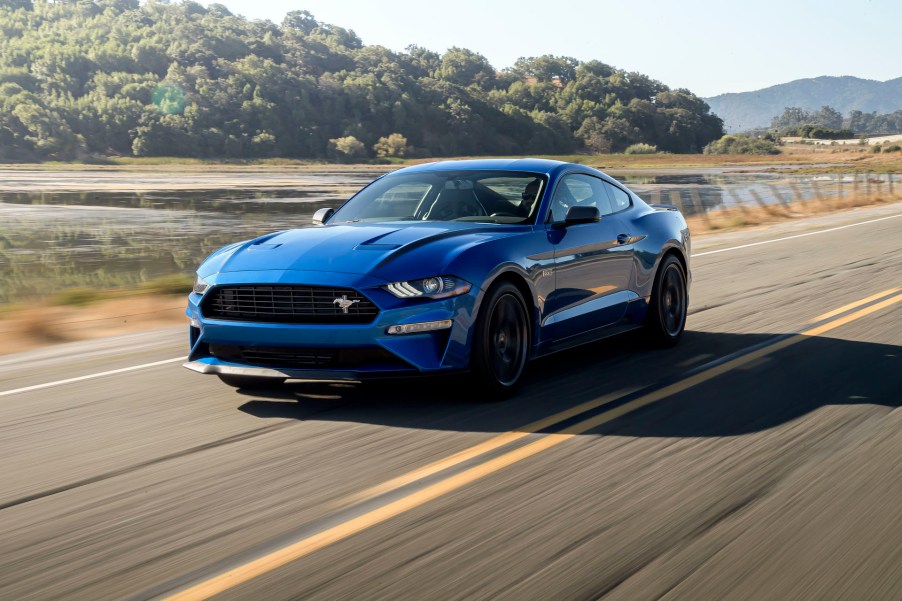
You Should Buy This Ford Mustang EcoBoost and Ditch the V8
Think of the Ford Mustang, and three things should come to mind, muscle car design, straight-line speed, and a V8 engine. Since sales of the iconic muscle car have been at a steady decline since 2015, Ford has had to get creative. As a result, we now have the EcoBoost High Performance Pack, a step away from the traditional recipe of just adding more power. A recent Motor1 road test coined it “The Anti-Mustang,” and it’s here to tempt you to ditch the V8.
The Ford Mustang isn’t the only muscle car in trouble

In 2015, over 122,000 Ford Mustangs found new homes, a massive decrease to the 72,489 cars that managed to do so in 2019. It’s a similar story when you look at the Chevy Camaro, with 77,502 finding homes in 2015, and just 48,266 in 2019. Things have gotten so bad for the Camaro that it is presumed to go out of production after 2022. The Dodge Challenger has suffered the least out of the three, with a modest decrease from 66,365 sold in 2015 and 60,997 in 2019.
Unfortunately for us, Ford counts the sales of all trim levels of the Mustang as one total figure. As a result, a sales comparison between the EcoBoost and the V8 is not possible. However, it would not be a stretch to assume that the four-cylinder model would be the most popular, given its low $26,670 starting price. It then begins to make sense why Ford would invest in its lower-priced model and produce its newest High Performance Pack option.
A Mustang with a Focus RS heart

Under the hood of the Ford Mustang EcoBoost HPP lives a 2.3-liter turbocharged four-cylinder engine. However, its 322 hp and 350 lb-ft of torque should indicate that it is not the same engine as the standard EcoBoost. According to Motor1, Ford engineers decided to get creative during the HPP’s development and swap in a Focus RS motor from a prototype. Following corporate approval, the Mustang EcoBoost HPP received a larger turbo, a new head gasket, and a larger radiator.
Motor1’s road test notes that the power delivery is the greatest asset the HPP has, producing max torque at just 3,000 rpm. The V8 mustang and its 7,500 rpm redline mean you’ll have to rev it out to get all of the available 460 hp. The availability of mid-range torque and a wider powerband should mean that in real-world scenarios, the instant response of the EcoBoost could be more useful than outright power.
The EcoBoost HPP is lighter, cheaper, and more efficient

A standard V8 Ford Mustang weighs around 3,705 pounds while the EcoBoost HPP weighs just 3,632 pounds. While it is by no means a Lotus Elise, the EcoBoost HPP saves a not inconsiderable 73 pounds. More importantly, however, all of the weight is coming out of the car’s nose, allowing the weight to distribute itself more evenly. If that’s not enough, the optional Handling Pack adds wider wheels wrapped in Pirelli P Zero Corsa tires, a limited-slip differential, MagneRide, and the stabilizer bars from the GT’s Performance Pack 2.
Optioned with all the performance bits, the Mustang EcoBoost HPP comes in at $33,660, well below the base GT’s $35,880 starting price. Option a GT to a similar spec, and you’ll be paying $45,575 without any other options.
The Mustang EcoBoost HPP is also more efficient, having a combined average of 22 mpg, a step above the V8 Mustang’s 18 combined mpg rating. Saving weight, gas, and money are all significant benefits to ditching the V8, and while the high-horsepower will always be the flagship, it great to see “The Anti-Mustang” carving its own lane.


